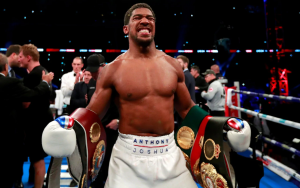Anthony Joshua is rattled. As the former holder of three of the world heavyweight title belts prepares to face Andy Ruiz in Saudi Arabia next Saturday there is an edge about the Londoner not seen for some time.
Joshua was forced to admit defeat in seven rounds against Ruiz six months ago in New York, a humbling moment in his career no matter how philosophically the 30-year-old approaches it. But the deposed world champion has accepted his errors on an otherwise unblemished resume, both in and out of the ring, since winning Olympic superheavyweight gold seven years ago.
“What do people think this is? This is fighting. One loss doesn’t take the spots off a cheetah,” Joshua said, with a defensive edge to his voice at his training camp in Sheffield. “I came into boxing to fight. I didn’t come to be a journeyman. I’ve been champion, I’ve been Olympic champion, I’ve been world silver medallist.”
Joshua feels undermined, disrespected, his achievements underplayed. And he may well be right.
“The belts never defined me – I walked as the champion even before I had the belts. Nothing has changed. I made it look easy, and people underestimated what I had achieved. We don’t play games when it comes to boxing, we’re serious and after I took the loss I’ve had time to reflect. I now have things to prove to myself. I want to take it more seriously because I’m going to that next level. And when I win, I will be like, ‘F*** everybody’.”
Joshua has not usually been this confrontational. But the heavyweight — who will have amassed an estimated £150 million in career earnings after the fight in Saudi Arabia — faces Ruiz at a pivotal moment in his career. He was outboxed last time by a small, rotund underdog. Now Joshua must demonstrate that he has learned to box as a big man and dominate the smaller man, until submission or a points victory. Both outcomes would spell redemption and a return to full respect for Joshua’s boxing abilities.
Psychologically, he faces a tough task, given that Ruiz floored him four times. History is arguably on Joshua’s side. Lennox Lewis, Muhammad Ali and Floyd Paterson all returned as champions after shock defeats, against respectively, Hasim Rahman, Leon Spinks, and Ingemar Johansson. Paterson was floored seven times by the Swede in his first defeat and then stopped his rival twice in succession.
This is a bigger fight for Joshua than his massive challenge against Wladimir Klitschko at Wembley Stadium in 2017, simply because he must win . Moreover, it sets up a thrilling 2020 — with Tyson Fury and the other world champion, Deontay Wilder, set to meet in Las Vegas on February 22. It all points to a showdown of epic proportions next summer — as long as Joshua can protect his chin.
There has also been advice from his old foe Klitschko, who had his own crisis and came back strong to reign for a decade. Joshua’s admiration for the Ukrainian is obvious.
“He’s more disciplined than me. He’s more diplomatic,” Joshua said.
What did Klitschko say to him? “Loads of stuff. Wlad was definitely ahead of the game. There was dietary and training advice from him which is maybe what you’re seeing in terms of the difference [in body shape]. Maybe that’s why — because I’ve adapted some of his teachings — and for that reason my weight may fluctuate.”
But the deepest advice Klitschko will have given him is about the development of his boxing. “I have stuff to prove to myself. That’s the main thing — I definitely have stuff I have to prove to myself,” admitted Joshua as he faces his 24th fight. “That’s where my hunger now comes from.
“Unfortunately it’s not a team sport, this game, so I have to prove it myself. The focus is not on the PR team, the trainers, it’s on Anthony Joshua. So it’s all down to me.”
Joshua’s final few words, for now, involve his destiny: the broad one, not just the one with his fists.

“When I came into boxing, unfortunately you hear all the stories of Larry Holmes having to get a bus home after a title fight, Mike Tyson losing a lot of his money, Evander Holyfield the same… and these are, like, the greatest.
“Honestly, one of my main objectives in this sport was to not be owned. Not be taken advantage of. Don’t you remember when I met you, Eddie?”, says Joshua, turning to promoter Eddie Hearn. “I was, like, ‘You’re not like Don King, are you?'”
They laugh out loud, but Joshua is serious in the point he is making. “You put so much into it. The belts are important, but when your career is over, someone else has them. That’s why the decisions I’ve made have always meant I’m a fighter but I conduct myself like a business.”
Wise stuff, but on that note, Joshua must get the business done against Ruiz in the dunes. Simple as that. And if so, his gargantuan story, redeemed, will continue under the lights.
